-
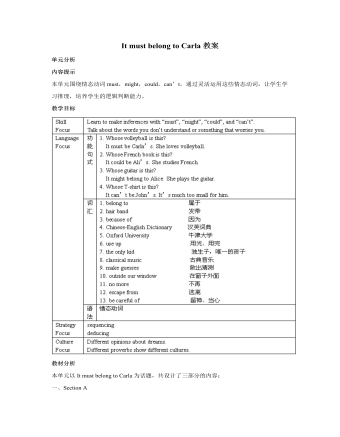
人教版新目标初中英语九年级上册It must belong to Carla教案
一、Section A该部分有4个模块。第一模块围绕Whose volleyball is this? 这一话题展开思维( 1a)、听力(1b)、口语( 1c)训练;第二模块围绕上一模块中的话题进行听力( 2a-2b)、口语训练( 2c);第三模块继续围绕前两个模块中的“making inferences”展开训练。训练形式为阅读排序( 3a)和两人问答(3b);第四模块仍就上一话题展开讨论。二、Section B该部分有4个模块。第一模块要求根据图画和所提供的单词写出合理的句子;第二模块在听力( 2a-2b)和分角色口语训练( 2c)的基础上,继续进行“推测”训练; 第三模块围绕“Strange events in Bell Tower neighborhood”这一话题展开阅读( 3a)和写作(3b -3c)训练;第四模块以dream为话题展开小组活动。三、Self Check该部分有3个模块。第一模块以填空形式对所学词汇进行训练;第二模块就8个谚语展开阅读和讨论。

人教版新目标初中英语九年级上册Where would you like to visit教案2篇
The First PeriodⅠ.Teaching Aims and DemandsKnowledge Objects(1) Key Vocabularytiring, educational, fascinating, thrilling, peaceful, exotic, trek, jungle, take it easy, explore, historic, site(2) Target LanguageWhere would you like to go on vacation?I’d like to trek through the jungle, because I like exciting vacations.2. Ability Objects(1)Train students to talk about places they would like to visit with the target language.(2)Train students to describe vacations with different adjectives.(3)Train students' listening skill.3. Moral Object,It′s more interesting to go on vacating somewhere instead of staying at home.Ⅱ. Teaching Key Points1. Key Vocabularytiring, educational, fascinating, thrilling, peaceful, exotic, trek, jungle, take it easy, explore, historic, site2. Target LanguageTalk about different places with the target language.Ⅲ. Teaching Difficult Points1. Describe vacations with different adjectives.2. Talk about different places with the target language.Ⅳ. Teaching Methods1. Teaching by illumination2. Teaching by doing chain drills3. Teaching by pairworkⅤ. Teaching Aids1. A tape recorder2. Some pictures of different places with famous views

人教版新目标初中英语九年级下册Rainy days make me sad教案
1. 教材分析本单元以how do things affect you?为话题, 从颜色、天气、音乐、广告、产品等方面谈论了外界事物如何影响人的心情。要求学生掌握表达某物或某事给人带来的感觉、看法或影响等。共设计了四个部分的内容:Section A 该部分有4个模块:第一模块围绕Which restaurant would you like to go to?这一话题展开思维(1a)、听力(1b)、口语(1c)训练;第二模块围绕How does music affect you? 进行听力(2a-2b)、口语训练(2c);第三模块继续围绕how do colors in the restaurant affect you这一话题展开训练,训练形式为阅读和问题体验(3a)和小组活动(3b);第四模块仍就How do things affect you这一话题以调查的形式展开讨论。Section B该部分有4个模块:第一模块围绕产品广告对人们的影响这一话题以“配对”(1a)与“列举”(1b)两种形式展开训练;第二模块继续围绕How do things affect you? 进行听力(2a-2b)、口语对话训练(2c);第三模块围绕“Advertising”这一话题展开阅读(3a-3b)和写作(3c)训练;第四模块围绕How posters affect you这一话题以口语训练形式展开小组活动。

人教版新目标初中英语九年级下册Could you please tell me where the restrooms are教案
Step Ⅰ RevisionCheck homework. Ask a few students to read the article in 3a.Then ask a few students to read their guides.Step Ⅱ Part 1Look at the words in the box. Ask a student to read them. Make sure the students understand the meaning of the words. You are to fill in the blanks with the words. In some cases, students may need to use another form of the word, for example adjusting for tense or subject/ verb agreement.Ask students to fill in the blanks on their own.Check the answers. Step ⅢPart 2Go through the instructions with the class.Look at the example with the students.Ask students what the answer would be.Ask a student to read the question and answer it.Excuse me, could you tell me where the bank is, please?The bank is across the street from the shopping malt.Get students to complete the work in pairs.Check the answers. Ask a few students to read their questions.Step Ⅳ Just for Fun!Ask all the students to read the conversation. Ask: What is funny about this cartoon? Help students to explain. A Martian is a person from the planet Mars.There is no such thing as Martian food on Earth, and the clerk looks silly because he is trying to think of where there is a Martian restaurant.Invite some pairs of students to present this conversation to the rest of the class.Step Ⅴ Summary and HomeworkIn this class, we’ve done much writing practice using the key vocabulary words and the target language presented in this unit. After class, please finish the questions in 2 in your exercise books. Then finish the exercises on pages 47~48 of the workbook as well.The Seventh Period Ⅰ Teaching Aims and Demands1. Knowledge Objects(1) Key Vocabularyimage, adventure, jealousy, hero, crime, journey, brave, no longer, show interest in, take it easy, become interested in, plain looks(2)Text:Grown-ups like cartoons, too.2. Ability Objects(1) Fast-reading to get a general idea of the text.(2) Careful-reading to get the detailed information in the text.

人教版新目标初中英语九年级下册I’ll help clean up the city parks教案
Talk about offering help (P60)I’ll help clean up the city parks.A: I’d like to work ...B: You could help ...Talk about ways to tell people about the Clean-Up Day (P61)We need to ...We can’t ...I’ll ...Talk about the work the volunteers do (P62)These three students all volunteer their time to help other people.Somebody loves to ... / helps ... / plans to ... / wants to ...A: What do you like doing?B: I like ... A: What kind of volunteer work do you think I could do?B: You could ...1. 重点词汇advertisement, fix, repair, pleasure, blind, deaf, shut, carry, specially, fetch2. 认读词汇hunger, homeless, cheer, clean-up, sign, establish, major, commitment, elementary, veterinarian, coach, similar, call-in, strategy, disabled, organization, unable, support, appreciate, donation, part of speech, pronoun, adverb, preposition, conjunction, donate, Jimmy, Sally3. 词组clean up, cheer up, give out, put off, set up, think up, take after, fix up, give away, put up, hand out, work out, at once

人教版新目标初中英语九年级下册We’re trying to save the manatees教案2篇
本单元主要围绕着有关濒临灭绝的动物这一话题,学习了应该怎样保护我们的环境,以及就某一问题展开辩论。目标提示语言目标能够运用所学知识,就某一问题展开辩论。认知目标1、复习一些语法:现在进行时、一般现在时、用used to 表示一般过去时、现在完成时、一般过去时的被动语态。2、学会表达同意和不同意。3、学会以下基本句型:We’re trying to save the manatees.Manatees eat about 100 pounds of food a day.There used to be a lot of manatees.In 1972,it was discovered that they were endangered.Some of the swamps have become polluted.情感目标了解一些濒临灭绝的动物的生活习性和濒临灭绝的原因,教育学生应该如何保护环境。教学提示充分利用多媒体等教学设备,创设与本课话题相关的情境,如各种不同种类的动物、动物园以及有关环境的画画等等。围绕着本单元的教学目标,设计一些贴近学生实际的教学任务,如让学生谈论自己最喜欢的动物,如何拯救濒危动物,如何保护环境等等。让学生根据所学知识,就动物园是否对动物有利以及其他的话题进行辩论。

人教版新目标初中英语九年级下册You’re supposed to shake hands教案
教学目标:1. 掌握本单元一些重点词汇的写法和用法。2. 学会自如谈论餐桌礼仪。Step 1 RevisionAsk some students to retell the customs at the table in France in the passage in 3a.Step 2 Self checkPart 1. Fill in each bland with the correct word given. Students do the exercises by themselves at first. Then check the answers. Ask the students to comprehend the sentences and help them point out uses of some words, like “arrive (at / in) sw., spend time / money on sth , spend time / money (in) doing sth.”Part 2. Read about Fan Ling’s experience in a western restaurant. Understand the passage. Point out some key points in the passage.1. be / get used to doing sth. 习惯做某事2. begin with = start with 以….开头3. crowd v. 挤满,塞满 the crowd 人群 crowded adj. 拥挤的Then students discuss about how she would solve her problem. Ask some to share their stories with others.Part 3. Complete the crossword by looking at the sentences on the left. Then check the answers.

新人教版高中英语必修1Unit 1 Teenage Life-Listening and Speaking & Listening and Talking教案
Step 2 Listening and Talking1. The teacher is advised to talk with their new students about the related topic: Boys and girls, do you know some structures to talk about future activities? Talking about future activitiesWe’ll …I plan to …There’ll be …I hope to …We’re going to …2. After their small talk, the teacher can move on by playing the listening and solve the following task.Underline the expressions in the sentences below Cao Jing and Max use to talk about the future.We’ll learn useful skills.I plan to improve my spoken English.There’ll be students from different schools.I hope to make new friends.We’ll talk about teenage life.I’ll learn to make a fire.There’ll be students from different countries at the camp.There’ll be some experts there to show us how to live in the wild.We’re going to learn about wildlife.I’m going to give a speech.I think I’m going to enjoy the activities.I think we’ll have a lot of fun.3. Work in groups. Plan a youth camp.Teacher make the Ss think of ideas for the camp. And they can use the questions below to get started. And have the Ss present their ideas for a youth camp to the class.●What kind of camp is it?●Who will be there?●What will they do?●What will they learn?

新人教版高中英语必修1Unit 2 Travelling Around-Listening and Speaking & Listening and Talking教案
【教学目标与核心素养】1. Instruct students to get main facts by listening and motivate them to talk about the topics about how to prepare for the trip and make reservations by listening and ultimately can make travel arrangements and reservations. 2. Develop students’ sense of cooperative learning and individual thinking capability. 3. Develop students’ different listening skills to solve different listening comprehensive problems.4. Help students to understand how to use the structures “the present continuous tense (be doing) is used to express future plans.【教学重难点】1. Teach students how to focus on key words, not on single words or grammar.2. Prompt Ss to talk about the related topics, such as how to prepare for the trip and make a travel plan.【教学过程】Step 1: Listening and SpeakingLead inThe teacher is advised to talk with their students about the places that they want to travel most both at home and abroad: boys and girls, if you have a chance to travel around the world, where will you go? After their small talk, the teacher can move on by finishing the following listening task:Before travelling, what do we need to prepare for the trip?

新人教版高中英语必修1Unit 3 Sports and Fitness-Listening and Speaking & Listening and Talking教案
Finally, after finishing the task above, the teacher is expected to instruct students to work in groups to finish the following project:Speaking ProjectWhat event or activity would you like to invite your friend to? Make a conversation with a partner.Ski Race: Zhangjiakou, a beautiful city in northern China, will host the Youth Ski Race in December.Track Meet: a great event for track –and –field lovers on 26 October.Gym Class: come and work out at a gym! You can make it.Part 2: Listening and Talking:The teacher is advised to talk with their new students about the related topic: Boys and girls , what do you think of sportsmanship? Let’s listen and find out:Play the listening and match each opinion with the right speaker. Who do you agree with? Why?Cao Jing _____________ Lily _____________ Max _____________A. An athlete should do his/her best to win.B. The girl should stop and help the other girl. Good sportsmanship is more important than wining!C. An athlete should think about honor and his/her fans if he/she is competing for his/her country.Listen again and circle the expressions that you hear in the conversation.

新人教版高中英语必修1Unit 3 Sports and Fitness- Discovering Useful Structures—tag questions教案
【教材分析】This teaching period mainly deals with the grammar: tag questions.This period carries a considerable significance to the cultivation of students’ spoken English. The teacher is expected to enable students to master this period thoroughly and consolidate the knowledge by doing some exercise of good quality.【教学目标与核心素养】1. Get students to have a good understanding of the basic usages of tag questions.2. Enable students to use the basic phrases structures flexibly.3. Develop students’ speaking and cooperating abilities.4. Strengthen students’ great interest in grammar learning.【教学重难点】1. How to enable students to have a good understanding of the basic usages of tag questions.2. How to enable students to use the basic usages of tag questions flexibly.【教学过程】Step1: 语法自主探究一、基本组成方法1.肯定式陈述部分+否定附加疑问部分(前肯后否) You often play badminton, don’t you? 你经常打羽毛球,是吗?You are going to the gym with me, aren’t you?你要和我一起去健身房,是吗?She’s been to shanghai before, hasn’t she? 她以前去过上海,是吗?2.否定式陈述部分+肯定附加疑问部分(前否后肯) It isn't a beautiful flower, is it? 那不是美丽的花,是吗?You didn't go skating yesterday, did you? 你昨天没去滑冰,是吗?They can’t finish it by Friday, can they?他们不能在星期五之前完成,是吗?

新人教版高中英语必修3Unit 5 The Value of Money-Discovering Useful Structures导学案
4.They were going to find someone to take part in their bet when they saw Henry walking on the street outside.[归纳]1.过去将来时的基本构成和用法过去将来时由“would+动词原形”构成,主要表示从过去某一时间来看将要发生的动作(尤其用于宾语从句中),还可以表示过去的动作习惯或倾向。Jeff knew he would be tired the next day.He promised that he would not open the letter until 2 o'clock.She said that she wouldn't do that again.2.表示过去将来时的其他表达法(1)was/were going to+动词原形:该结构有两个主要用法,一是表示过去的打算,二是表示在过去看来有迹象表明将要发生某事。I thought it was going to rain.(2)was/were to+动词原形:主要表示过去按计划或安排要做的事情。She said she was to get married next month.(3)was/were about to+动词原形:表示在过去看来即将要发生的动作,由于本身已含有“即将”的意味,所以不再与表示具体的将来时间状语连用。I was about to go to bed when the phone rang.(4)was/were+现在分词:表示在过去看来即将发生的动作,通常可用于该结构中的动词是come,go,leave,arrive,begin,start,stop,close,open,die,join,borrow,buy等瞬间动词。Jack said he was leaving tomorrow.
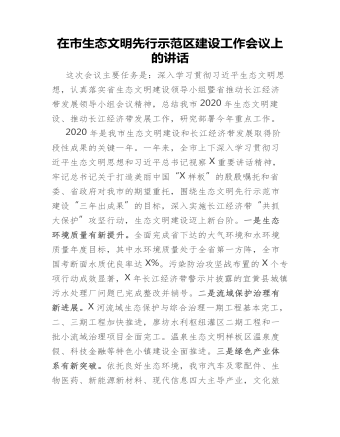
在市生态文明先行示范区建设工作会议上的讲话
一是生态环境质量有新提升。全面完成省下达的大气环境和水环境质量年度目标,其中水环境质量处于全省第一方阵,全市国考断面水质优良率达X%。污染防治攻坚战布置的X个专项行动成效显著,X年长江经济带警示片披露的宜黄县城镇污水处理厂问题已完成整改并销号。
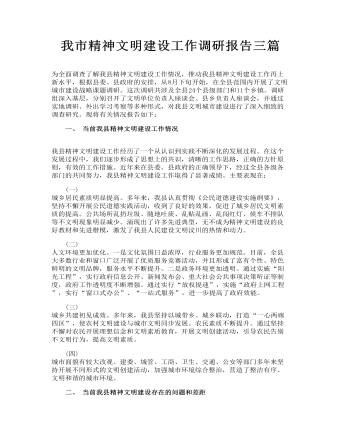
我市精神文明建设工作调研报告三篇
(一) 城乡居民素质明显提高。多年来,我县认真贯彻《公民道德建设实施纲要》,坚持不懈开展公民道德实践活动,收到了良好的效果,促进了城乡居民文明素质的提高。公共场所乱扔垃圾、随地吐痰、乱贴乱画、乱闯红灯、候车不排队等不文明现象明显减少。涌现出了许多先进典型,无不成为精神文明建设的良好教材和先进楷模,激发了我县人民建设文明汶川的热情和动力。 (二) 人文环境更加优化。一是文化氛围日益浓厚,行业服务更加规范。目前,全县大多数行业和窗口广泛开展了优质服务竞赛活动,并且形成了富有个性、特色鲜明的文明品牌,服务水平不断提升。二是政务环境更加透明。通过实施“阳光工程”,实行政府信息公开、新闻发布会、重大社会公共事项决策听证等制度,政府工作透明度不断增强。通过实行“放权提速”,实施“政府上网工程”,实行“窗口式办公”、“一站式服务”,进一步提高了政府效能。
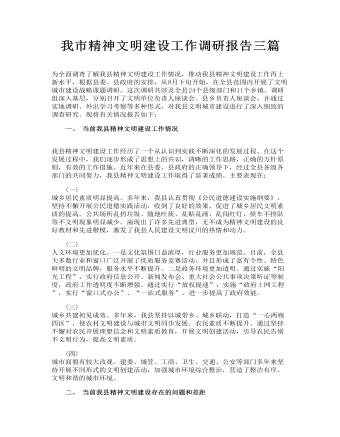
我市精神文明建设工作调研报告三篇
(一) 城乡居民素质明显提高。多年来,我县认真贯彻《公民道德建设实施纲要》,坚持不懈开展公民道德实践活动,收到了良好的效果,促进了城乡居民文明素质的提高。公共场所乱扔垃圾、随地吐痰、乱贴乱画、乱闯红灯、候车不排队等不文明现象明显减少。涌现出了许多先进典型,无不成为精神文明建设的良好教材和先进楷模,激发了我县人民建设文明汶川的热情和动力。 (二) 人文环境更加优化。一是文化氛围日益浓厚,行业服务更加规范。目前,全县大多数行业和窗口广泛开展了优质服务竞赛活动,并且形成了富有个性、特色鲜明的文明品牌,服务水平不断提升。二是政务环境更加透明。通过实施“阳光工程”,实行政府信息公开、新闻发布会、重大社会公共事项决策听证等制度,政府工作透明度不断增强。通过实行“放权提速”,实施“政府上网工程”,实行“窗口式办公”、“一站式服务”,进一步提高了政府效能。
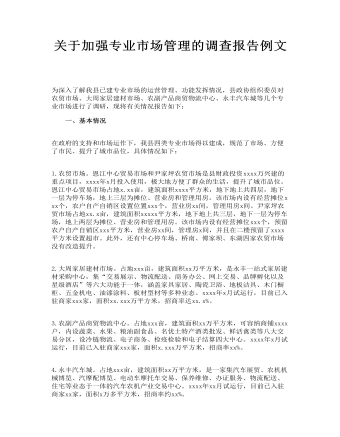
关于加强专业市场管理的调查报告例文
1.农贸市场。恩江中心贸易市场和尹家坪农贸市场是县财政投资xxxx万兴建的重点项目,xxxx年x月投入使用,极大地方便了群众的生活,提升了城市品位。恩江中心贸易市场占地x.xx亩,建筑面积xxxx平方米,地下地上共四层,地下一层为停车场,地上三层为摊位、营业房和管理用房。该市场内设有经营摊位xxx个,农户自产自销区设置位置xxx个,营业房xx间,管理用房x间。尹家坪农贸市场占地xx.x亩,建筑面积xxxxx平方米,地下地上共三层,地下一层为停车场,地上两层为摊位、营业房和管理用房。该市场内设有经营摊位xxx个,预留农户自产自销区xxx平方米,营业房xx间,管理房x间,并且在二楼预留了xxxx平方米设置超市。此外,还有中心停车场、桥南、傅家坝、东湖四家农贸市场没有改造提升。
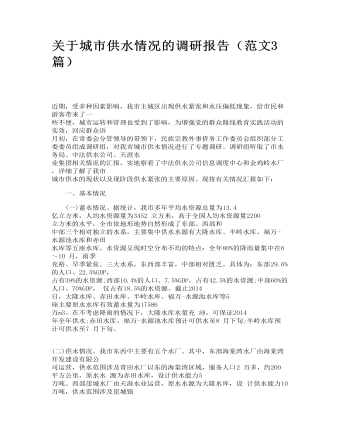
关于城市供水情况的调研报告(范文3篇)
(一)蓄水情况。据统计,我市多年平均水资源总量为13.4 亿立方米,人均水资源量为3452 立方米,高于全国人均水资源量2200 立方米的水平,全市依地形地势自然形成了东部、西部和 中部三个相对独立的水系,主要集中供水水源有大隆水库、半岭水库、福万-水源池水库和赤田 水库等五座水库。水资源呈现时空分布不均的特点:全年80%的降雨量集中在6~10 月,雨季 充裕、旱季紧张。三大水系,东西部丰富,中部相对匮乏。具体为:东部29.6%的人口、22.5%GDP, 占有39%的水资源;西部10.4%的人口、7.5%GDP,占有42.5%的水资源;中部60%的人口、70%GDP, 仅占有18.5%的水资源。截止2014 日,大隆水库、赤田水库、半岭水库、福万-水源池水库等5 座主要原水水库有效蓄水量为17586 万m3。在不考虑降雨的情况下,大隆水库水量充 沛,可保证2014 年全年供水;赤田水库、福万-水源池水库预计可供水至8月下旬;半岭水库预 计可供水至7 月下旬。
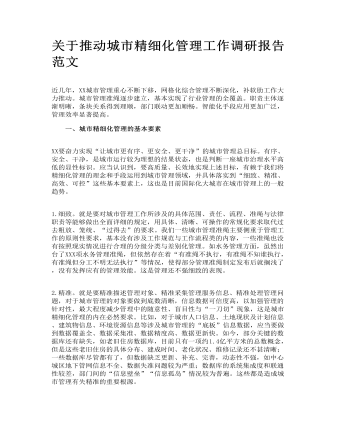
关于推动城市精细化管理工作调研报告范文
1.细致。就是要对城市管理工作所涉及的具体范围、责任、流程、准绳与法律职责等能够做出全面详细的规定,用具体、清晰、可操作的常规化要求取代过去粗放、笼统、“过得去”的要求。我们一些城市管理准绳主要侧重于管理工作的原则性要求,基本没有涉及工作规范与工作流程类的内容,一些准绳也没有按照现实情况进行合理的分级分类与差别化管理。如水务管理方面,虽然出台了XXX项水务管理准绳,但依然存在着“有准绳不执行,有准绳不知谁执行,有准绳但分工不明无法执行”等情况,使得部分管理准绳制定发布后就搁浅了,没有发挥应有的管理效能。这是管理还不强细致的表现。
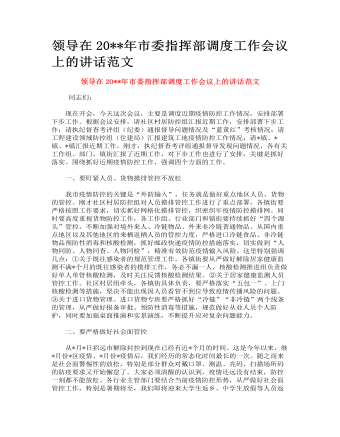
领导在市委指挥部调度工作会议上的讲话范文
一、要盯紧人员、货物摸排管控不放松 我市疫情防控的关键是“外防输入”,任务就是做好重点地区人员、货物的管控。刚才社区村居防控组对人员摸排管控工作进行了重点部署,各镇街要严格按照工作要求,切实抓好网格化摸排管控,织密织牢疫情防控摸排网。同时要高度重视货物防控工作,各工作组、行业部门和镇街要持续抓好“四个源头”管控,不断加强对境外来人、冷链物品、外来非冷链普通物品、从国内重点地区以及其他地区的来栖返栖人员的管控力度,严格进口冷链食品、非冷链物品预防性消毒和核酸检测,抓好邮政快递疫情防控措施落实,切实做到“人物同防、人物同查、人物同检”,精准有效防范疫情输入风险。这里特别强调几点:①关于既往感染者的规范管理工作。各镇街要从严做好解除居家健康监测不满*个月的既往感染者的摸排工作,务必不漏一人,核酸检测推进组负责做好单人单管核酸检测,及时关注反馈核酸检测结果。②关于居家健康监测人员管控工作。社区村居组牵头,各镇街具体负责,要严格落实“五包一”、上门核酸检测等措施,坚决不能出现因人员看管不到位导致疫情传播风险的问题。③关于进口货物管理。进口货物专班要严格抓好“冷链”“非冷链”两个线条的管理,从严做好报备审批、预防性消毒等措施,规范做好从业人员个人防护,同时要加强桌面推演和实景演练,不断提升应对复杂问题能力。 二、要严格做好社会面管控 从*月*日招远市解除封控到现在已经有近*个月的时间。这是今年以来,继*月份*区疫情、*月份*疫情后,我们经历的常态化时间最长的一次。随之而来是社会面警惕性的放松,特别是部分群众对戴口罩、测温、亮码、扫描场所码的防疫要求又开始懈怠了。大家必须清醒的认识到,疫情还远没有结束,防控一刻都不能放松。各行业主管部门要结合当前疫情防控形势,从严做好社会面管控工作,特别是暑期将至,我们即将迎来大学生返乡、中学生放假等人员返乡潮,社区村居防控组牵头要提前做好意愿返栖人员摸排工作,提前对接落实管控措施。文旅部门要深刻吸取北京天堂超市酒吧事件教训,从严做好KTV、影院等娱乐场所的管控。对于其他门头店、商场超市、农贸市场、农村大集、养老机构、学校、建筑工地等重点场所,各行业主管部门和镇街要切实担负起监管责任和属地责任,从严督促做好各项防控工作,真严、真管确保守牢守好全市疫情防控工作底线。
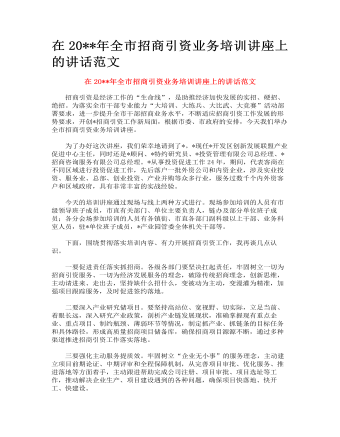
全市招商引资业务培训讲座上的讲话范文
招商引资是经济工作的“生命线”,是助推经济加快发展的实招、硬招、绝招。为落实全市干部专业能力“大培训、大练兵、大比武、大竞赛”活动部署要求,进一步提升全市干部招商业务水平,不断适应招商引资工作发展的形势要求,开创*招商引资工作新局面,根据市委、市政府的安排,今天我们举办全市招商引资业务培训讲座。 为了办好这次讲座,我们荣幸地请到了*。*现任*开发区创新发展联盟产业促进中心主任,同时还是*顾问、*特约研究员、*投资管理有限公司总经理、*招商咨询服务有限公司总经理。*从事投资促进工作24年,期间,代表客商在不同区域进行投资促进工作,先后落户一批外资公司和内资企业,涉及实业投资、服务业、总部、创业投资、产业并购等众多行业,服务过数千个内外资客户和区域政府,具有非常丰富的实战经验。 今天的培训讲座通过现场与线上两种方式进行。现场参加培训的人员有市级领导班子成员,市直有关部门、单位主要负责人,链办及部分单位班子成员;各分会场参加培训的人员有各镇街、市直各部门副科级以上干部、业务科室人员,驻*单位班子成员,*产业园管委全体机关干部等。 下面,围绕贯彻落实培训内容、有力开展招商引资工作,我再谈几点认识。 一要促进责任落实抓招商。各级各部门要坚决扛起责任,牢固树立一切为招商引资服务、一切为经济发展服务的理念,破除传统招商理念,创新思维,主动请进来、走出去,坚持缺什么招什么,变被动为主动,变漫灌为精准,加强项目跟踪服务,及时促进签约落地。 二要深入产业研究储项目。要坚持高站位、宽视野、切实际,立足当前、着眼长远,深入研究产业政策,剖析产业链发展现状,准确掌握现有重点企业、重点项目、制约瓶颈、薄弱环节等情况,制定抓产业、抓链条的目标任务和具体路径,形成高质量招商项目储备库,确保招商项目源源不断,通过多种渠道推进招商引资工作落实落地。

